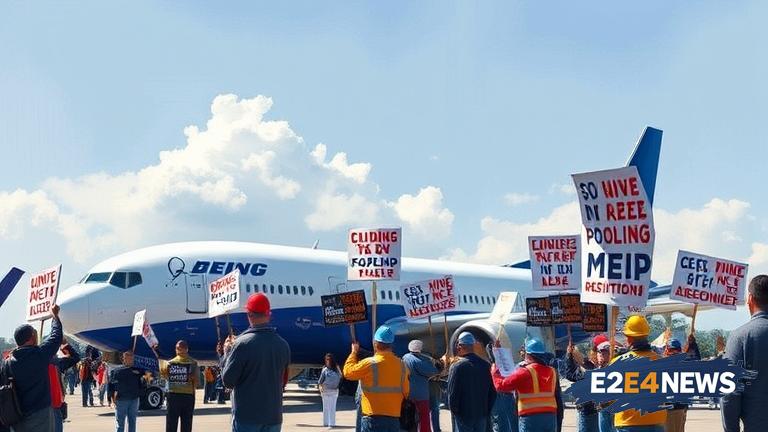In a significant development, more than 3,000 Boeing workers have initiated a strike after rejecting a contract offer proposed by the company. The strike, which commenced on August 3, 2025, is expected to have a substantial impact on Boeing’s production and operations. The workers, who are members of the International Association of Machinists and Aerospace Workers (IAMAW), had been negotiating with the company for several months. However, they ultimately rejected the contract offer, citing concerns over wages, benefits, and working conditions. The strike is the latest in a series of labor disputes affecting the aerospace industry. Boeing, one of the world’s largest aerospace companies, has been facing increased competition and pressure to reduce costs. The company had proposed a contract that included wage increases and benefits, but the workers felt that it did not adequately address their concerns. The IAMAW has stated that the strike will continue until a fair and equitable contract is reached. The strike is expected to affect Boeing’s production of commercial aircraft, including the 737 and 787 models. The company has already faced significant delays and disruptions in its production schedule due to supply chain issues and other factors. The strike may further exacerbate these problems, potentially leading to delays and cancellations of aircraft deliveries. Boeing has stated that it is committed to reaching a resolution with the union and minimizing the impact of the strike on its operations. However, the company has also warned that the strike may have significant consequences for its business and the broader aerospace industry. The strike has drawn attention from industry analysts and experts, who are watching the situation closely. Some have expressed concerns that the strike could have a ripple effect on the entire aerospace industry, potentially leading to further labor disputes and disruptions. Others have noted that the strike highlights the ongoing challenges facing the industry, including rising costs, increased competition, and workforce shortages. The strike is also expected to have a significant impact on the local economy, particularly in areas where Boeing has a large presence. The company is one of the largest employers in the region, and the strike may lead to economic losses and job insecurity for workers and their families. As the strike continues, both sides are likely to engage in intense negotiations to reach a resolution. The IAMAW has stated that it is committed to fighting for the rights and interests of its members, while Boeing has expressed its desire to reach a fair and equitable contract. The outcome of the strike is uncertain, but it is clear that it will have significant implications for the aerospace industry and the workers involved. The strike is a reminder of the ongoing challenges facing the industry, including labor disputes, supply chain issues, and increased competition. As the situation continues to unfold, industry analysts and experts will be watching closely to see how it affects Boeing and the broader aerospace industry. The strike may also have implications for other industries, including manufacturing and transportation. The use of strikes as a bargaining tool is not uncommon in labor disputes, but it can have significant consequences for companies and workers. In this case, the strike may lead to delays and disruptions in Boeing’s production schedule, potentially affecting the company’s bottom line. The strike is also a reminder of the importance of labor unions in protecting the rights and interests of workers. The IAMAW has played a crucial role in representing the interests of Boeing workers, and its efforts have helped to secure better wages and working conditions for its members. As the strike continues, it is likely that other labor unions will be watching closely, potentially leading to further labor disputes and negotiations in the industry.
